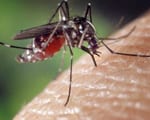What you need to know about the safety and health of your food
Health and science reporter Richard Laliberte with Prevention Magazine has covered research carried out in the fruit fly lab of SMU biologist Johannes H. Bauer. The research by Plano, Texas high school student Ria Chhabra is featured in the article, “Is Organic Food Really Better For You?,” published Aug. 21.
Bauer, an assistant professor in SMU’s Department of Biological Sciences, mentored Chhabra in her research to examine whether there would be health differences to fruit flies fed an organic diet or a nonorganic diet. Chhabra’s study found that flies fed an organic diet fared better on important health tests, particularly fertility and longevity.
EXCERPT:
By Richard Laliberte
Prevention Magazine
The Chhabra household of Plano, TX, couldn’t resolve a family dispute. “My husband and I are vegetarian,” says Babita Jain Chhabra. “Our family already eats more fruits and vegetables than most people, and they’re expensive.” Her husband wanted to buy cheap produce at Walmart. Babita said no—the family should buy organic products because their two children needed the healthiest food possible.“She just assumed organic was healthier,” says Babita’s 16-year-old daughter, Ria, channeling her father’s skepticism. “That’s what sparked my interest.”
Ria, who was only 13 when the organic debate broke out at her dinner table, decided to settle it. She launched a middle school science fair project that bloomed into more than 2 years of research and eventually involved two Southern Methodist University researchers, Santharam Kolli and Johannes H. Bauer. This year, their study, which found that fruit flies that ate organic foods did better in almost every health measure the researchers tracked (living longer, laying more eggs, resisting stress better, and acting livelier) than those that ate conventionally grown food, was published in PLOS One, an online peer-reviewed scientific journal.
For the Chhabras, it was case closed. They are now buying organic. “Because of Ria’s experiment, we know that in the long run, organic food will be better for us than anything else,” Babita says.
Most Americans are dabbling in organics—81% of families buy organic at least some of the time, according to a 2013 survey by the Organic Trade Association. And there are plenty of experts who think everyone should be as decisive as the Chhabras. One of them is Charles Benbrook, PhD, a research professor at Washington State University’s Center for Sustaining Agriculture and Natural Resources.
Last year, when a widely publicized Stanford University study analyzing more than 200 research papers comparing the benefits of eating organic versus conventionally grown food concluded that organic food isn’t any healthier, Dr. Benbrook corrected their math. Utilizing government data on pesticide toxicity, he countered with his own findings that there’s a full 94% reduction in health risks if you eat organic rather than conventional foods. The Stanford researchers had looked at nine old studies about pesticide residue on produce and noted that organics have 30% fewer toxins than conventional crops—but failed to calculate the health benefits based upon the most recent USDA data on actual residues in food.
Follow SMUResearch.com on Twitter.
For more information, www.smuresearch.com.
SMU is a nationally ranked private university in Dallas founded 100 years ago. Today, SMU enrolls nearly 11,000 students who benefit from the academic opportunities and international reach of seven degree-granting schools. For more information see www.smu.edu.
SMU has an uplink facility located on campus for live TV, radio, or online interviews. To speak with an SMU expert or book an SMU guest in the studio, call SMU News & Communications at 214-768-7650.



 The Undying Radio: Familiarity breeds content when it comes to listeners and music
The Undying Radio: Familiarity breeds content when it comes to listeners and music Mosquito indexing system identifies best time to act against potential West Nile Virus outbreaks
Mosquito indexing system identifies best time to act against potential West Nile Virus outbreaks Sweden, SMU psychologists partner to launch parenting program that reduces child abuse
Sweden, SMU psychologists partner to launch parenting program that reduces child abuse Chemical probe confirms that body makes its own rotten egg gas, H2S, to benefit health
Chemical probe confirms that body makes its own rotten egg gas, H2S, to benefit health Study: High-volume Bitcoin exchanges less likely to fail, but more likely to suffer breach
Study: High-volume Bitcoin exchanges less likely to fail, but more likely to suffer breach